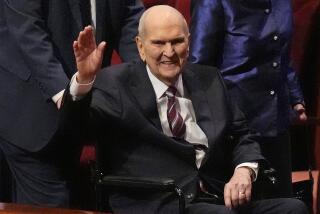As United Methodist leaders tighten LGBTQ ban, churches struggle with path forward
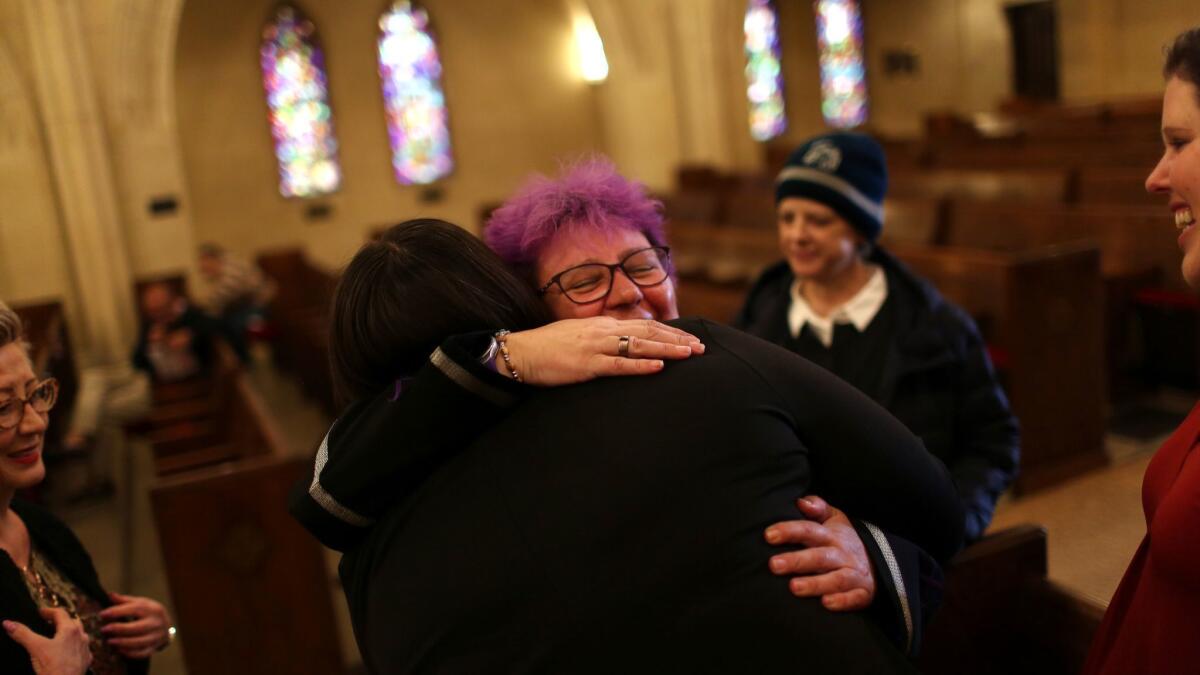
- Share via
Tim Baudler was taught that God doesn’t love gay people.
When he was about 10, he realized he liked other boys. So Baudler, who grew up in a conservative church in Iowa, made himself a promise: If he made it to 20 and still felt the same way, he was going to kill himself.
At 15, he was found to have a malignant brain tumor and was given days to live. He was relieved. God, he thought, was taking care of everything. He wouldn’t have to commit suicide, and he wouldn’t have to be gay.
But he made it to 20. Then 30. His family shunned him. He moved to California, where he found Hollywood United Methodist Church. The Rev. Kathy Cooper Ledesma told him, “We’re your family now.”
“I had to be rewired to learn that God does love me, and he saved my life for me to show love to other people,” said Baudler, 49, lead usher at Hollywood UMC.
But like so many gay Methodists, Baudler now feels betrayed by the United Methodist Church, which is fighting a civil war over homosexuality so acrimonious that it could split the denomination.
At a gathering last month in St. Louis, the General Conference, the church’s top policy-making body, voted to tighten its ban on gay clergy and same-sex marriage and to increase the punishment for violations.
Comprising some 800 clergy and lay people from around the world, the General Conference voted 53% to 47% to affirm current church policy declaring “the practice of homosexuality is incompatible with Christian teaching.”
The decision laid bare stark regional differences in the increasingly global denomination and served as a blow to more socially liberal churches, particularly on the West Coast, that have been pushing for full inclusion of LGBTQ people.
Although forbidden by the church’s Book of Discipline, which contains the denomination’s laws and doctrines, many pastors — particularly in the Western Jurisdiction, which includes California — officiate same-sex weddings. There also are numerous openly gay members of the clergy. In 2016, the Western Jurisdiction elected the denomination’s first openly lesbian bishop.
Shortly after the General Conference vote, Bishop Grant Hagiya of the California-Pacific Annual Conference wrote in a statement that he was “deeply conflicted.”
“The question is, ‘Can I stay in a repressive and oppressive church with integrity?’” he wrote. “After a sleepless night, I came to a new resolve. I believe I must stay in the UMC and lead our people within the geographical context we find ourselves in the West.”
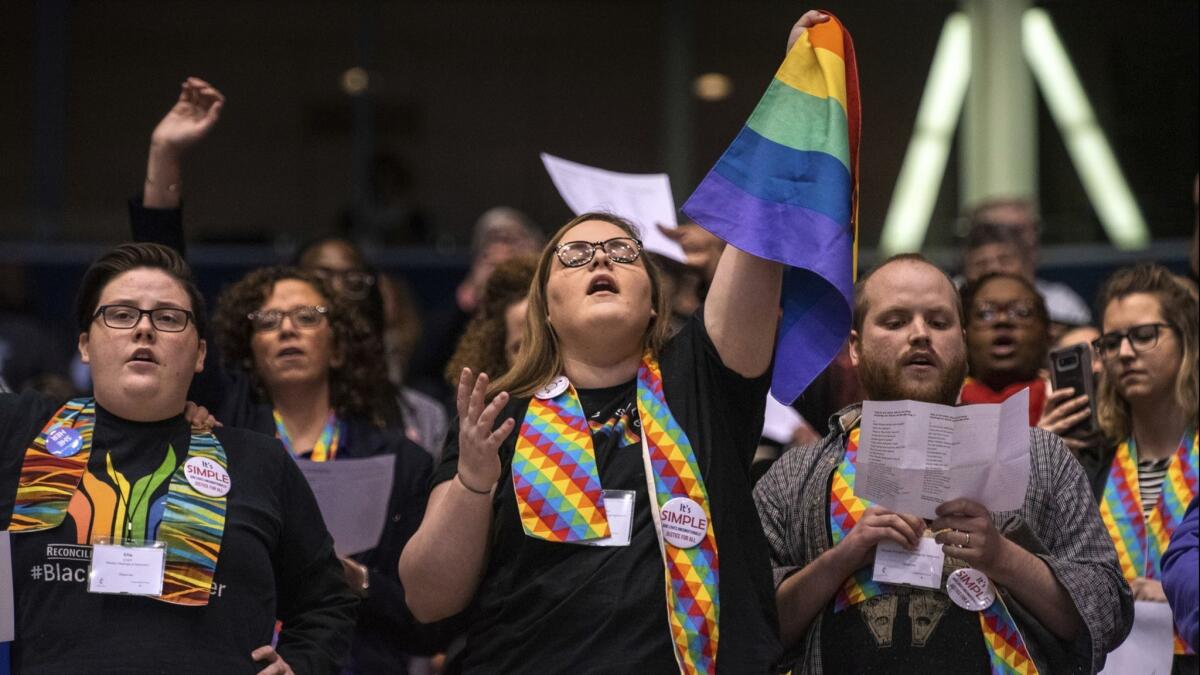
At the General Conference, delegates chose between multiple plans for how the church should proceed. An option called the One Church Plan would have allowed local ministers to choose their own stance on homosexuality.
“We have essentially been operating with a One Church ethos here in the West,” Hagiya told The Times. “Mostly, it is don’t ask, don’t tell, or live and let live.”
The General Conference instead chose what was called the Traditional Plan — punishing ministers who perform same-sex marriages with a one-year, unpaid suspension on the first offense and termination on the second.
The vote was supported by a vocal, well-funded alliance of conservative American churches and the denomination’s increasingly influential African bloc. Church membership is growing in Africa, where, in dozens of nations, homosexuality is a crime. African delegates made up 32% of the General Conference.
The Rev. Jerry Kulah of Liberia told the conference that the church in Africa is “growing by leaps and bounds because we are committed to biblical Christianity.” If United Methodists become more permissive of homosexuality, he said, “the church in Africa would cease to exist.”
On Thursday, the church announced that it was investigating voting irregularities at the General Conference. The church said it appears some delegates who were “correctly denied credentials” to vote later obtained them.
Membership in the U.S. has been declining for years, but with some 7 million followers, the United Methodist Church is the nation’s second-largest Protestant denomination, behind the Southern Baptist Convention. It is also one of the country’s oldest religious populations, with a median age of 57.
Progressives fear the church’s stance on sexuality will drive away young people. Conservatives believe the acceptance of same-sex marriage will only accelerate declining attendance.
The Wesleyan Covenant Assn., an Ohio-based alliance of some 1,500 theologically conservative congregations, led the charge against same-sex marriage and said it had planned to leave the denomination if the Traditional Plan were struck down.
It all comes down to “sexual ethics,” said the Rev. Keith Boyette, the group’s president, explaining that a pastor should have sex only if he or she is in a heterosexual marriage. A gay person, he said, could be ordained — but could never get married or have sex.
“It’s not just the issue of human sexuality that divides the church,” Boyette said. “We’re divided on the authority and interpretation of Scripture … we’re divided on what constitutes sin.”
About half of the United Methodists support legal same-sex marriage, according to the Pew Research Center’s 2014 religious survey, and views have shifted even further in favor of it since then, researchers said. Some 49% of Methodists supported gay marriage then, 43% opposed it, and 8% were unsure. Some 60% of church members believed homosexuality should be accepted by society.
Along with the Traditional Plan, the General Conference passed so-called disaffiliation legislation that would make it easier for churches to leave the denomination.
The Rev. Anne Burkholder, associate dean of Methodist studies at Emory University in Atlanta, said the denomination in America has dealt with schisms in the past, notably its 1844 geographic split over slavery. A series of mergers led to the 1968 creation of the United Methodist Church.
In modern times, Burkholder said, the issue of LGBTQ rights has been uniquely discordant, especially along the rural and urban divide. Various factions of the church, both liberal and conservative, are weighing their options, but a denominational split would have enormous consequences — including questions over property rights, clergy pensions and the church’s constitution.
“I think over the next 10 years we’re going to see some major realignment of Methodism in the U.S.,” Burkholder said. “But I’m not, at this point, willing to predict what that’s going to look like.”
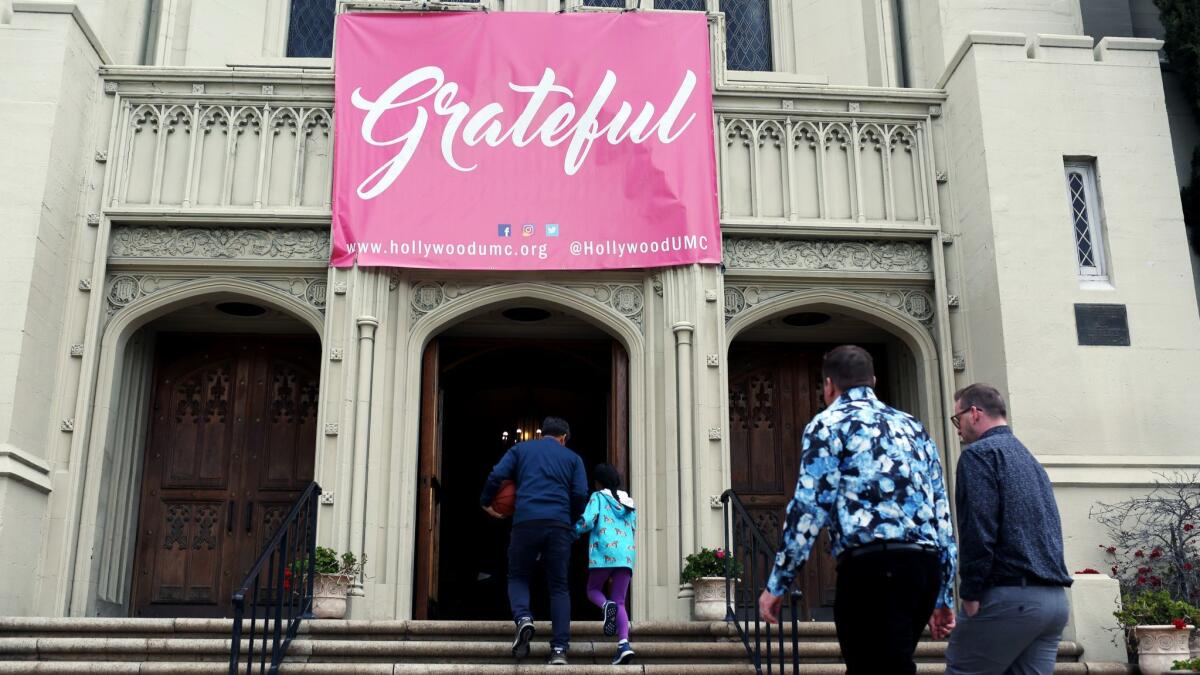
Many California congregations long have operated in open defiance of the church’s stance on homosexuality.
The Rev. Frank Wulf is the openly gay pastor of Echo Park United Methodist Church. Founded in 1906, the parish has tried to keep pace with the demographic and cultural changes of a rapidly gentrifying neighborhood. Wulf fears the General Conference decision will impede the growth of his congregation, which has 86 members.
“We have to put it out in a very public way that LGBT people are welcome in this place. We can’t just whisper it in the corners,” he said.
As a seminary student in Southern California in the 1970s — when the church added its restrictive language about homosexuality to the Book of Discipline — Wulf agonized over being gay. It was something he couldn’t change, despite years of prayer.
Eventually he moved to New York, went back to school to become a professor, and fell in love.
His partner, Tom, had AIDS. When his illness progressed, the couple moved to California so Tom could be with family. Wulf went back to work in the Methodist Church, where he was still closeted.
Tom died on a Friday in 1992. Wulf had to preach on Sunday as if nothing had happened.
In his grief, Wulf wrote a coming-out letter to his bishop and was asked to surrender his credentials. The church investigated him for a year and a half, and Wulf was able to remain ordained because of a technicality: At the time, the Book of Discipline forbade “self-avowed practicing homosexuals” from becoming ordained ministers but did not define the term. (It was later defined.)
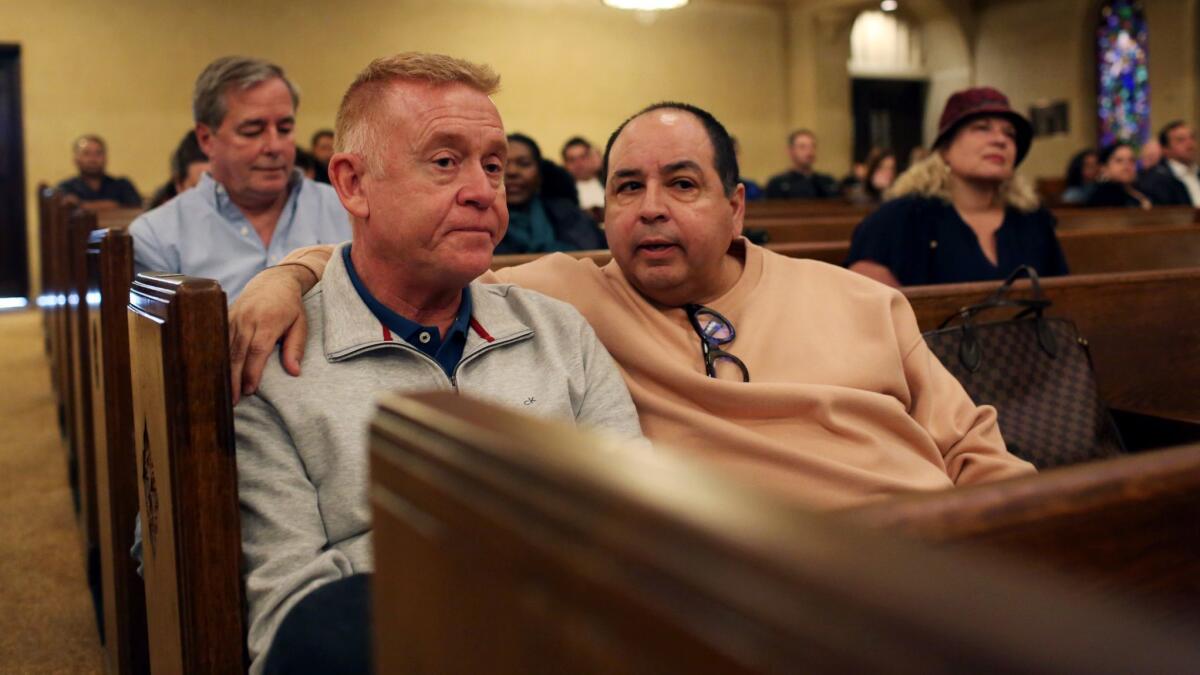
Perhaps no United Methodist Church in California has championed making gay rights central to its mission more than Hollywood United Methodist.
In 1993, in the midst of the AIDS crisis, the church put an enormous red ribbon on its English Gothic-style bell tower to support the afflicted. The congregation became largely LGBTQ, and church attendance in recent years has thrived.
On a recent Sunday, a rainbow flag was draped over the altar. Cooper Ledesma told worshipers that “our denomination … is going to need to repent. It’s going to need to address our complicity, our overly indulgent patience with the structural homophobia … that has been codified in the Book of Discipline.”
The congregation cheered when Cooper Ledesma declared: “I will continue to marry church members of the same gender in this sanctuary. Amen?”
In the pews were Ricky and Dillon Woodard of Oklahoma City, who married in December — but not in their own United Methodist church. Their associate pastor wept when she told them she couldn’t preside over their ceremony. Ricky said it was surreal hearing Cooper Ledesma say she would perform weddings.
“That fear is not, fortunately, hanging over her,” he said.
Many unknowns remain. The church’s supreme court, the Judicial Council, has already ruled that several hard-line portions of the originally proposed Traditional Plan — including a provision that would have let the church search potential ministers’ social media for evidence of homosexuality — are unconstitutional. The Judicial Council will review the Traditional Plan and disaffiliation legislation next month. If approved, they will go into effect in January.
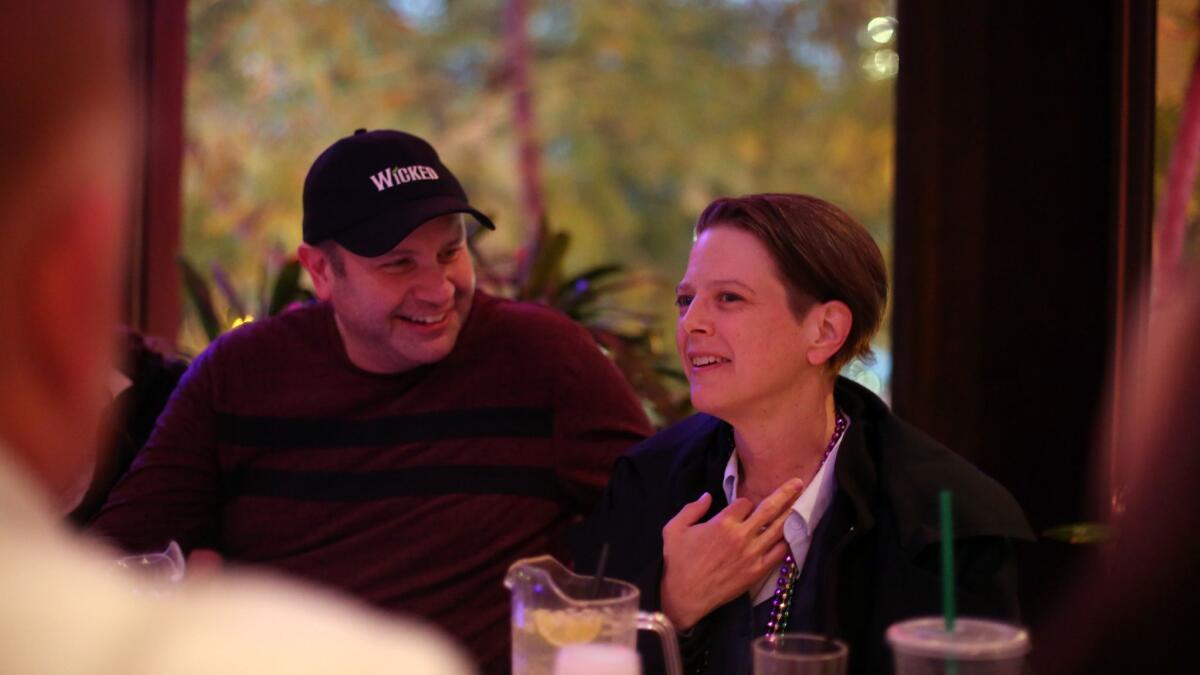
Gathered on a recent Tuesday around margaritas and chips at Micky’s, a West Hollywood gay bar, LGBTQ members of Hollywood United Methodist recounted the week’s blessings and disappointments.
Leading the weekly gathering was the Rev. Denyse Barnes, the church’s associate pastor, an out lesbian with bright purple hair. Although she was devastated by the recent vote, she joked about the Book of Discipline’s restrictions against “self-avowed practicing homosexuals.”
“I’m not practicing,” she said. “I’m really good at it.”
April Anderson, the church’s finance chair, who identifies as queer, suggested people who thought Jesus wouldn’t love gay people should think back to what they learned in Sunday school.
“Feel free to point out to me where Jesus talks about gays and how they are unworthy,” she said. “I’ll wait.”
Twitter: @haileybranson
More to Read
Sign up for Essential California
The most important California stories and recommendations in your inbox every morning.
You may occasionally receive promotional content from the Los Angeles Times.


